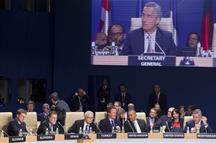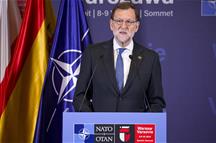"A stronger, more united and better prepared NATO has come out of this summit", says Mariano Rajoy
President's News - 2016.7.9
1. Mariano Rajoy attends NATO SummitPool Moncloa/Jorge Villar2016.7.9
Warsaw (Poland)
The meeting in Warsaw has led to progress being made in unity among the allies and in ensuring that NATO can adapt to the new challenges at a crucial time for our security, declared the President of the Government.
According to Mariano Rajoy, "a stronger, more united and better prepared NATO has come out of this summit, with greater ability to adapt to tackle the complex security scenario surrounding us".
 Pool Moncloa / Diego CrespoAmong the initiatives approved by the Heads of State and Government present at the summit, the President of the Government highlighted the policy to "strengthen dissuasion and defence", with a 360-degree focus, which looks not just towards the east but also to the south. "I am referring, for example, to the battalions that will be deployed in Poland and the Baltic States, to the way to improve our ability to adapt to the new forms of conflict, not only at a military level but also in scenarios of instability that allow us to anticipate future crises", specified the President of the Government.
Pool Moncloa / Diego CrespoAmong the initiatives approved by the Heads of State and Government present at the summit, the President of the Government highlighted the policy to "strengthen dissuasion and defence", with a 360-degree focus, which looks not just towards the east but also to the south. "I am referring, for example, to the battalions that will be deployed in Poland and the Baltic States, to the way to improve our ability to adapt to the new forms of conflict, not only at a military level but also in scenarios of instability that allow us to anticipate future crises", specified the President of the Government.
Another of the initiatives approved at this Summit aims to project stability "beyond our borders". Mariano Rajoy explained that this seeks "to support our more vulnerable neighbours, particularly on the southern flank, so that they can be responsible for their own security since our security depends on theirs".
In this regard, Mariano Rajoy spoke of "the need to stabilise Africa politically and ensure its development, a principle that has been one of the priorities of our foreign policy and which is fully in line with the conclusions from this summit".
As regards Afghanistan, the President of the Government acknowledged that "despite the progress made over the last year and the efforts made in the reconciliation progress by the Government of Afghanistan, the presence of NATO troops currently deployed still remains necessary". That is why NATO has decided to extend the mission to the country beyond 2016 "in the hope that the people of Afghanistan can become fully responsible for their own security".
Deployment in the Baltic States and Poland
 Pool Moncloa / Diego Crespo
Pool Moncloa / Diego Crespo
In terms of Spain's commitment in the deployment of four battalions in Latvia, Lithuania, Estonia and Poland approved by NATO on Friday, the President of the Government stressed the government's full intention to meet the commitments to its allies. However, he clarified that "at this time no decision has been taken on this issue or on the country our troops will be sent to, and neither has any decision been taken on the form and method of our collaboration.
Relations with Russia and the crisis in Ukraine were also present on the agenda of this summit, pointed out Mariano Rajoy. The common position adopted by NATO, he said, "is for relations to be based on a combination of dissuasion and dialogue. We must not forget that Russia is our most important neighbour and a key player in many international theatres. Ukraine will receive firm support from the allies, which will translate into a comprehensive raft of aid, support and armed forces."
Missions overseas
 Pool Moncloa / Diego CrespoIn his speech, the President of the Government recalled the more than 2,000 compatriots who are presently deployed on missions overseas, "because they are the ones who are entrusted with carrying out the actions we propose to protect our values, our citizens and our territory. Through their good work and commitment, they contribute to enhancing the name of Spain across the world".
Pool Moncloa / Diego CrespoIn his speech, the President of the Government recalled the more than 2,000 compatriots who are presently deployed on missions overseas, "because they are the ones who are entrusted with carrying out the actions we propose to protect our values, our citizens and our territory. Through their good work and commitment, they contribute to enhancing the name of Spain across the world".





